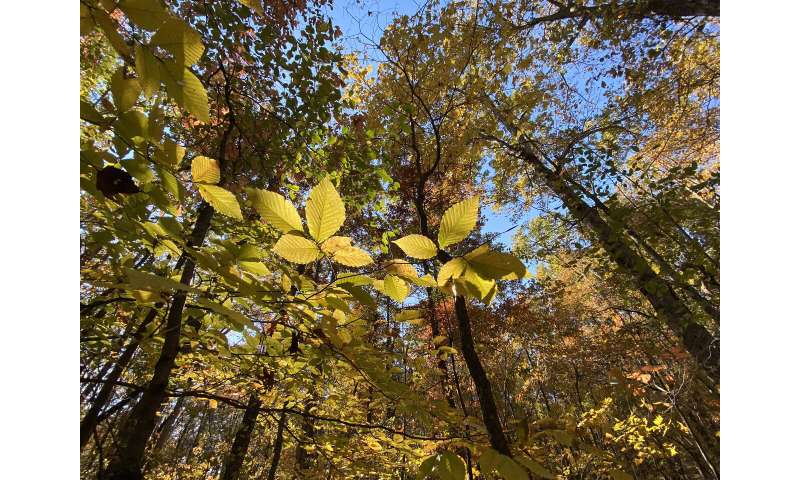UT AgResearch and The Nature Conservancy to partner on working woodlands

The University of Tennessee Institute of Agriculture (UTIA) and The Nature Conservancy (TNC) have signed a historic agreement to manage the university's forested research properties under the highest standards for forest management while also selling carbon credits to benefit society and fight climate change.
UTIA is the first academic institution to enroll in TNC's Working Woodlands Program, which was established in 2009 to engage landowners in securing and sustainably managing their forestlands to benefit the environment and local livelihoods. This also represents the first time a university forest will have a registered carbon offset project.
Through Working Woodlands, the UT Forest Resources AgResearch and Education Center will work to achieve Forest Stewardship Council (FSC) certification for 11,400 acres of forested properties that spread across four counties. FSC certification is considered the most rigorous certification available for conservation-based management of forests that actively sell timber. FSC certification may also provide landowners with improved market access and price premiums for certified forest products.
In addition to forest certification, as part of the agreement, TNC will provide a conduit for the university to access carbon offset markets. Specifically, TNC will facilitate developing and maintaining a carbon offset project on the UT forests and market carbon credits to buyers on the voluntary carbon market.
"This agreement will not conflict with our land-grant mission to provide research, teaching and solutions to land owners and property managers," says Kevin Hoyt, director of the UT Forest Resources AgResearch and Education Center. "All current forestry and wildlife management research efforts will continue, and the added revenue will help ensure that the center can provide space and resources for future forestry, wildlife and land management research."
All 10 UT AgResearch centers model working farms and forests through the sale of agricultural and forest products as part of their management plans.
According to Trisha Johnson, TNC's director of forest conservation in Tennessee, UT's forests and surrounding lands represent some of the best-maintained and highest conservation priorities within Tennessee and the Southern Appalachians. In addition to implementing a long-term forest management strategy, the agreement will support cutting-edge research and establish an alternative revenue source for UT's forested properties.
"In this type of agreement, companies or institutions voluntarily purchase verified carbon credits to offset their emissions of carbon dioxide," said Johnson. A landowner can quantify the amount of carbon on their property and, after verification by a third party, can sell the credits to a willing buyer. Carbon markets are emerging as a valuable approach to sustaining and improving forests while providing a new source of income. She adds, "Through this partnership, UT and TNC can test, improve and promote an approach that can benefit millions of acres of Tennessee's public and private forests."
Hongwei Xin, dean of the UT AgResearch, says the agreement is a win-win partnership between the University and TNC, and will prove beneficial for society. "The Forest Resources Center will continue to provide one of the most comprehensive outdoor research laboratories in the nation while, at the same time, maintaining forest sustainability for future generations," said Xin.
The 40-year agreement also includes creation of a Climate Smart Forestry Fund that will provide support for UT's research on the impacts of a changing climate on forests and forest owners. Xin adds, "The Climate Smart Forestry Fund will enhance our ability to train pre-professionals such as student interns and conduct mission-oriented research by our faculty and graduate students."
The agreement will not affect public use and access to the 250-acre UT Arboretum in Oak Ridge. "The Arboretum is a valued public resource," says Hoyt. "It will continue to provide a venue for a multitude of public and private community events, from Boy Scout meetings, to weddings, to visitors and hikers just seeking some solitude in the shade."
Hoyt and Johnson expect forest inventories to begin in January 2020. The partners will seek to secure certification of the tract forests and develop the carbon project in 2021.
Provided by University of Tennessee Institute of Agriculture